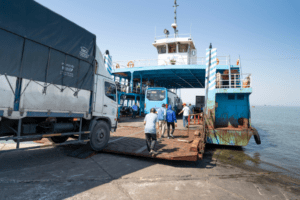13 November - 19 November

Excess Containers Are Suffocating The Global Maritime Market
This week, we’re covering the shortage of container storage space, US Treasury Secretary Janet Yellen’s address on “friend-shoring,” forced labor laws in the Xinjiang province of China, and more.
IN THE NEWS
Your Weekly Spotlight
When the COVID-19 pandemic started, containers were in high demand due to increasing demand from consumers. Companies like Amazon even invested in new containers to cater to increasing demand. But now, in 2022, supply chains are facing the opposite problem with there being an excess of containers. On top of falling freight rates, data shows container depots — used to house containers after they are unloaded — are now filling up or packed. There is just not enough depot space to accommodate all the containers.
This trend indicates more signs of falling global demand and an impending economic slowdown. Traders and shippers say the decline in global consumer demand is not a sign the global economy is normalizing after a frantic post-lockdown consumption rush but a downward shift in consumption appetites. Clearly, as inflation sets in, people across the globe are tightening their purse strings and buying less than they did in 2020-21.
As demand drops, retailers and manufacturers have to deal with excess inventory, excessive containers, and a lack of storage space for all that. In fact, according to experts, the typical peak season shipments did not even happen this year as retailers are already neck-deep in excess inventory. As a result, containers have been waiting at terminals and depots for weeks on end, waiting to be repositioned, taking up valuable space. New containers thus have to be kept on ships till space can be made to accommodate them.
TOP HITS THIS WEEK
From The Manifest

How To Avoid Demurrage Fees (and Save Your Customers Money)
As container rates fall from their peak, shippers are finally getting a respite from inflated shipping costs over the past couple of years. However, many

5 Key Performance Metrics for Freight Forwarders
An important benefit that digitization offers the logistics industry is the ability to easily analyze data, resulting in the successful identification and monitoring of important
This Week at Logixboard
Watch our latest webinar
In case you missed it, you can check out our webinar:
From Booking to the Warehouse: How to offer your clients an end-to-end digital customer experience that will
drive revenue.
SUMMING IT UP
Key Takeaway
Since the cargo is on time again, we see a slowdown in new ordering as companies adjust to more efficient turnaround times in ocean freight delivery. But with a slowdown, comes excess containers sitting in packed depots and warehouses. To combat full and overflowing depots, ports such as the Port of Houston have started levying fees for empty containers sitting in terminals for more than seven days.
While many containers are waiting to be loaded or unloaded, there is a large number of containers on ships or at ports for weeks at a time, just sitting empty as well though! This leaves stakeholders with insufficient depot space which only exacerbates the ongoing supply chain crisis as it impacts container repositioning and movement. It’s a vicious cycle that needs to be solved, maybe by designating more storage space across different areas, so that the excess can be taken care of quickly.
WHAT’S HAPPENING AROUND THE WORLD
Highlights
- US Treasury Secretary Janet Yellen said her country is using a tactic called “friend-shoring” to minimize supply chain vulnerabilities, in an era where certain countries are using trade as a geopolitical weapon.
- After nearly two and a half years of struggling with a taxed supply chain, developers have learned to become more adept at responding to a seemingly endless series of price spikes, delays, and shortages, as construction activity resumes fully.
- Emergency supplies of pain and fever medication are expected to arrive soon at hospitals overwhelmed by respiratory illnesses in Canada, but observers say more can be done to guard against future drug shortages.
- A traffic jam of container ships has dissipated outside the ports of Los Angeles and Long Beach, enabling US imports to flow freely again through a critical gateway.
- US diesel shortage squeezes farmers, homeowners, and the White House. US diesel inventories are at near-record lows, rattling a wide swath of the economy from fuel suppliers to farmers — and creating more turbulence for Biden.
ON OUR RADAR
Trending
More than 1,000 shipments of solar components have been blocked at US ports since June under a new law that bans exports from China’s Xinjiang region due to concerns about forced labor, according to a recent report by Reuters. China’s Xinjiang region, which is home to roughly 50% of the global supply of polysilicon, has fallen under scrutiny for its human rights abuses and the forced labor of Uyghurs and other ethnic minorities in China. Beijing has repeatedly denied allegations of forced labor.
The Uyghur Forced Labor Prevention Act (UFLPA) places a “rebuttable presumption” that goods from the region are made with forced labor, and it places the burden of proof on buyers to show that the imported goods have no connection to forced labor whatsoever. To be in compliance with UFLPA, companies must provide comprehensive supply chain maps, complete lists of all workers, and proof that workers were not subjected to forced labor practices. Corporations such as Coca-Cola and Nike lobbied against the UFLPA, as their supply chains are deeply woven into China’s economy.
Reuters reported that US Customs and Border Protection seized 1,053 shipments of solar energy equipment between June 21 and Oct. 25. In August, ROTH Capital Partners said that more than 3 GW of components had been held up by US customs. It is estimated that 9 GW to 12 GW of solar modules could be prevented from entering US markets by the end of the year.
Module supply challenges have been an ongoing issue in the United States, exacerbated by pandemic-related shutdowns, higher shipping costs, semiconductor supply chain challenges, the enforcement of the UFLPA, and other trade and labor laws. Companies dealing with solar products need to diversify their supply chains and have clear fragmentation in markets in order to do business profitably.


